Zero-waste pioneer, presenter of 12 television series, author of four books, mentor and official chef to the Latin Grammy Awards: these are some of the many hats that Argentine chef Dolli Irigoyen has worn over five decades. A household name in her homeland as well as on TV screens across the continent, Irigoyen is the winner of the Icon Award – part of Latin America’s 50 Best Restaurants 2023, sponsored by S.Pellegrino & Acqua Panna – for her countless contributions to the culinary arts. But, while her career may sound glitzy, her story is far from it
When Dolli Irigoyen was growing up, using everything was one of the central tenets in her home. Her grandparents were first-generation immigrants from Spain’s Basque Country, France and Italy, and Irigoyen was born in General Las Heras, an agricultural town in the province of Buenos Aires. “It was an interesting mix with respect to gastronomic traditions and culture in each home,” she recalls. “My French grandfather was a true gourmand and he grew anything and everything in his orchard: pears, apples, figs, kumquats, strawberries and all kinds of vegetables.”
Her upbringing in Las Heras was akin to living in a pantry, as her Basque grandfather, meanwhile, ran a dairy farm. Irigoyen’s morning routine included fetching fresh milk for breakfast, hunting hare or gathering sweetcorn, watermelon or sunflower seeds grown by her father. Thus, respect for products was instilled in her from an early age. “I grew up surrounded by the aromas of bay leaf and rosemary, fruits and vegetables – it was basically a sin to buy parsley or spring onions from the store,” she says.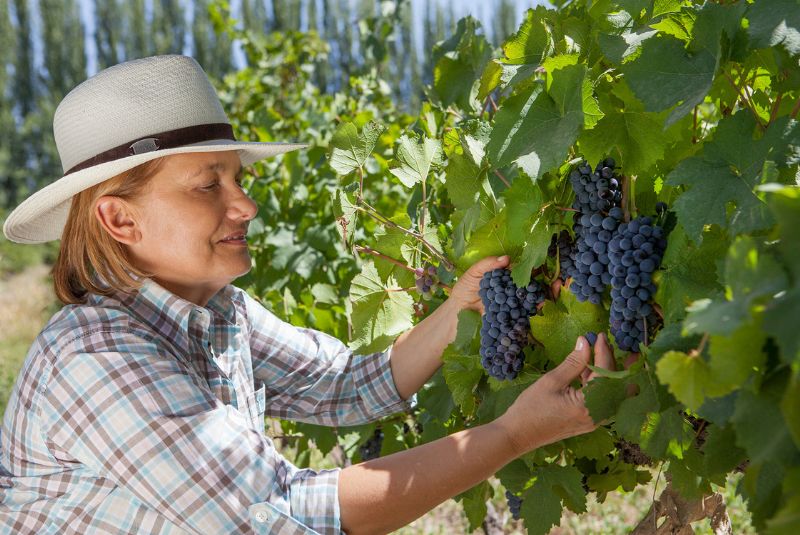
Irigoyen learnt from her family to respect and celebrate ingredients
And nothing was ever wasted: the home was self-sufficient. “We didn’t buy any ingredients and we used everything up. We had a henhouse, so we’d make cakes according to the number of eggs laid that morning. My grandmother and mum were fantastic cooks, and mum in particular loved baking. At breakfast, we’d already be talking about lunch. And when we got home from school, she’d be waiting for us with a scone or a piece of cake.
“As for my abuela, the greatest thing I learnt from her was using up every last ingredient. She didn't throw anything away. If veggies were left over, she’d make buñuelos (fritters). If there was leftover rice, a frittata. It was always a feast at her house, because she’d prepare five or six dishes including soup and stew from next to nothing. She was a master in jams and conserves and taught me how to make them. My abuela’s pantry was stuffed with jars; I can still taste her incredible plum jam.”
Putting the pantry into practice
After high school, Irigoyen qualified and then worked as a primary school teacher and social assistant, soon marrying. Aged 23 and now mother of twins, life’s hurdles meant she urgently needed to generate better income – so she turned her hand to baking.
“Making cakes at home meant I could look after my kids. A local restaurant started ordering desserts such as lemon pie and chocolate mousse, and others followed suit. Then, I was offered the local sports club’s concession, a restaurant for 120 diners, and that’s where I started to put into practice what I knew – putting ingredients first,” she says.
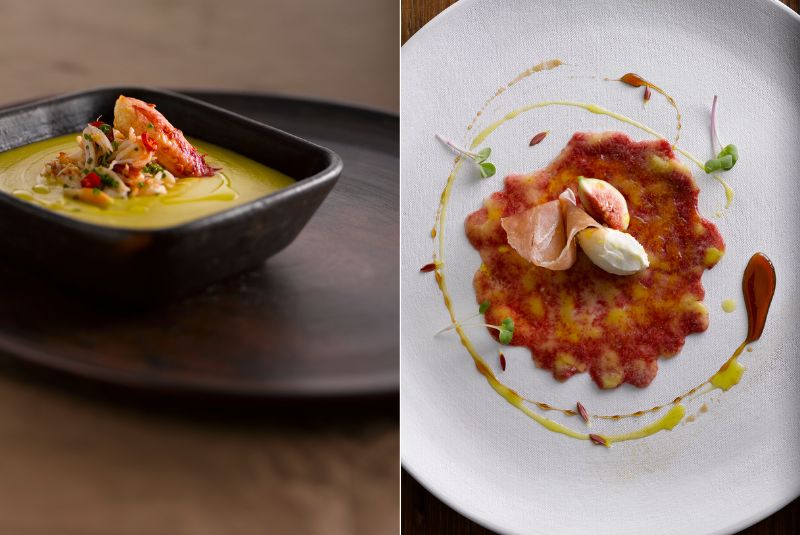
Two of Irigoyen's creations: corn soup and fig carpaccio
Mornings began at five, driving to a village 25 kilometres away to buy the best fresh chicken. Irigoyen worked with a baker so he would produce the size and shape loaves and rolls that she wanted. The baker’s brother was a fruit and vegetable farmer whom she asked to cultivate certain products to order; it was the starting point for her future influence. “He grew spinach for my ravioli and broccoli [for the restaurant], and he was really happy as he told me: ‘Now you’re using broccoli, I’ve started to sell a lot more.’”
While the dishes she prepared were traditional favourites such as tongue in vinaigrette, vitello tonnato and porchetta, Irigoyen’s dedication to the highest-quality seasonal produce caught the eye of national supermarket chain Carrefour, and she was hired to help improve its fresh produce department. A restaurant in the city of Buenos Aires followed suit in the early 1980s.
She continued sourcing fresh goods from the local farmers she already knew, while she would go in person to the Mercado Central for proteins. More doors opened, including harmonising food to wine when Patagonian wineries invited her to sample their wares in situ. “After visiting the Río Negro valley, I learnt about the wonderful orchard fruits, such as apples, pears, cherries and quince, that we cultivate [in Argentina].”
The power of knowledge
That journey was one of her first forays into discovering Argentina’s diverse pantry. “I discovered how generous our country is. Mendoza was a total discovery, not just for wine but olives and olive oil. Then came the northwest and its spices, Mesopotamia’s citrus fruits… I started understanding what was cultivated in each place,” she recalls.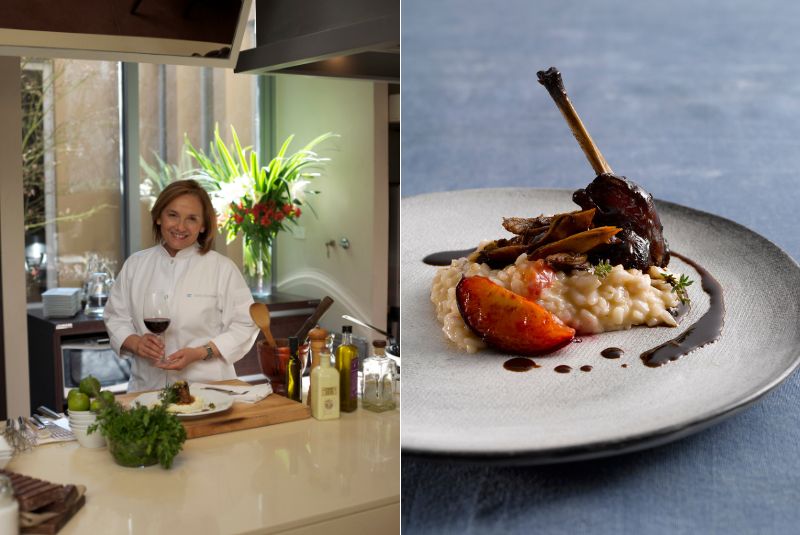
Irigoyen has enjoyed a prolific career as a TV chef and host
Some of her first television shows shone a spotlight on the Argentine pantry: Descubriendo Sabores (Discovering Flavours) focused on the north of the country, while Cocina Regional Argentina (Regional Argentine Food) was filmed in the south of the province of Buenos Aires. El Gourmet TV channel soon had her crossing frontiers and filming around Latin America.
Her countless journeys have long aimed to create a virtuous circle for small local producers – and it started in the mountains of Jujuy. A farmer appeared, his mule laden with bags filled with small Andean potatoes, a rarity in Buenos Aires markets for the time. Irigoyen says: “I asked him who they were for, and he said: ‘For my son, the doctor, so he has potatoes year-round.’ They cultivated for themselves, not to sell, and I realised that we cooks could help by creating demand and getting these products out into the world.”
While Irigoyen has travelled extensively, filming and giving classes in Europe, North America, Australia, China and other Asian countries, the teacher is her best pupil, seeking out stages in order to continue learning and passing on knowledge. “One of my most magical experiences was presiding over Argentina’s Bocuse d’Or committee, while I’m also proud I wrote weekly for La Nación newspaper for four years,” she highlights. That series culminated in a collection of three books, Cocina para Todos (Cooking for Everyone), which focused on starters, mains and desserts.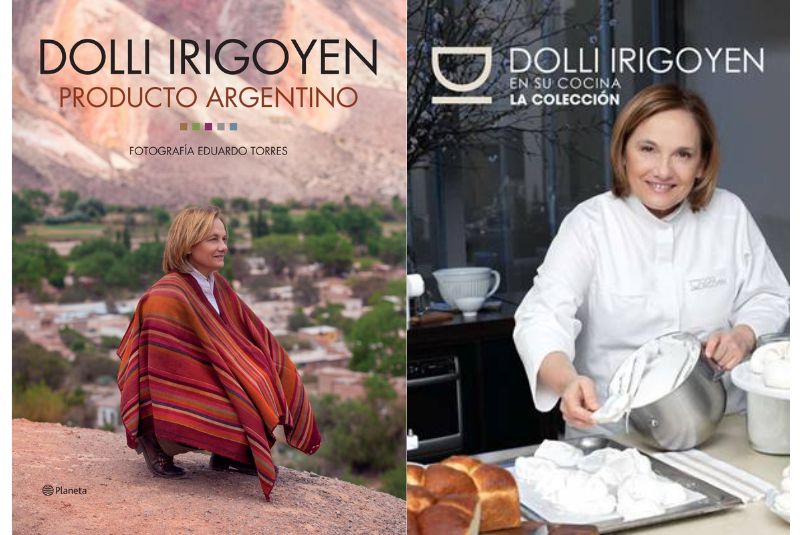
The chef's books cover produce, recipes and travel
“I love those projects and I love travelling to eat. The first thing I do is head to a market, not just to see stands or stores, but to eat what the people eat. And I’m always buying books for the library at Espacio Dolli.”
A professional home
Upcycling a factory from two decades ago, Irigoyen’s intimate space in the Colegiales district of Buenos Aires is her professional home and Espacio Dolli is definitely multipurpose: test kitchen, culinary school, private restaurant and events space, library and store for her beloved preserves, pickled produce and legendary spice collection. It’s a family-run affair: Irigoyen and son Ernesto Lanusse try wines before deciding how to pair them, while her daughter-in-law Leticia Arnada assists both. “It’s a place where I can cook at any time of the day, every day, for friends and family, because cooking isn’t just my hobby, it’s my passion,” she says.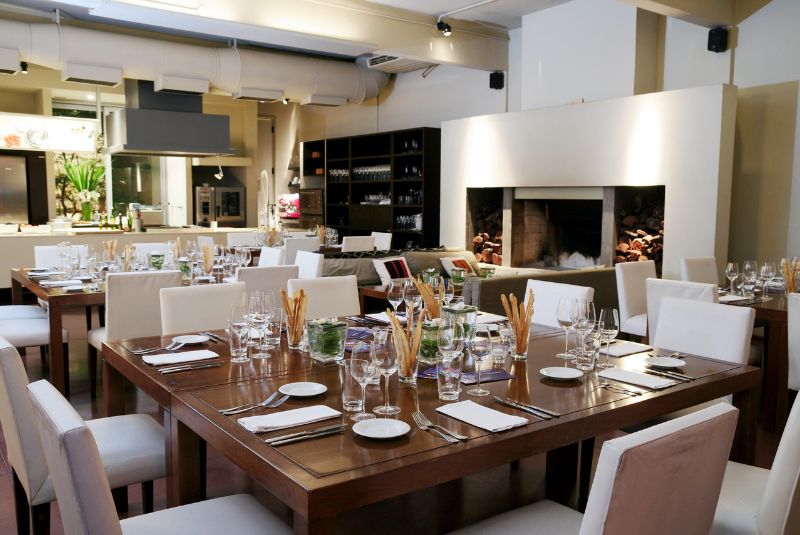
Espacio Dolli is Irigoyen's multipurpose creative workshop in Buenos Aires
A host of chefs have graduated from the ‘University of Irigoyen’, opening their own restaurants and culinary schools around the world. “It’s one of the things I’m proudest of,” she adds.
A household name for Latin American bon vivants, Irigoyen may cook for celebrities, but she has never lost sight of her motivation. “My biggest passion is to continue travelling, discovering new places and cooks, and cooking around Argentina,” she says.
As for the award, the teacher, chef and now Latin American icon says: “It’s an honour to have been selected by my colleagues. Recognition is always a stimulus to continue learning, teaching, researching and creating.”
Travel to General Las Heras with Irigoyen and witness the chef in action:
The list of Latin America’s 50 Best Restaurants 2023, sponsored by S.Pellegrino & Acqua Panna, will be announced on Tuesday 28th November from Rio de Janeiro. To stay up to date with the latest news, follow us on Instagram, Facebook, X and YouTube, and sign up to our newsletter.
